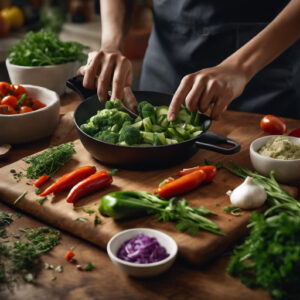
Incorporating a diverse range of plant-based foods into your diet every week is a fundamental aspect of plant-based eating that can profoundly impact your overall health and well-being. Expanding your diet to include a wide range of plant-based foods, including sources of plant protein, is crucial for promoting gut health, strengthening your immune system, lowering the chances of chronic diseases, and aiding in weight loss all at once. This article delves into the numerous health advantages of consuming a varied plant-based diet. It provides practical suggestions for integrating various plant foods into your meals. If you're looking to improve your eating habits or thinking about incorporating Meatless Mondays into your routine, adding a variety of plants and increasing your vegetable intake can significantly impact your overall health.
Benefits of Plant Diversity
By diversifying your diet with various plants, you can experience numerous health advantages. These include better digestion, a more robust immune system, decreased inflammation, and improved mental well-being. A varied plant-based diet promotes the development of beneficial gut microbes, which are essential for these improvements. Incorporating diverse plants into your diet can contribute to a well-rounded nutritional profile, providing you with essential vitamins, minerals, fibre, and antioxidants. This diversity also fosters the generation of short-chain fatty acids, crucial in preserving gut health and overall well-being.
Scientific Support
A wealth of research supports incorporating a more comprehensive range of plants into our diets to enhance our overall well-being. Studies have consistently demonstrated the numerous benefits of consuming a diet rich in fresh fruits and vegetables. Incorporating more than five servings of these nutritious foods into your daily routine can significantly lower the likelihood of falling ill, improving brain function, nutrient levels, and gut health. These findings highlight the significance of incorporating various plant-based options into our meals. Research has consistently demonstrated that incorporating a wide variety of plants into your diet can significantly reduce the likelihood of developing chronic illnesses like heart disease, diabetes, and certain types of cancer, such as colorectal cancer. By incorporating a wide variety of plants into your diet, you can maximise their numerous health benefits.
Beyond Vitamins
At first, there was a strong emphasis on vitamins such as E and C, which resulted in the widespread use of supplements. Research has indicated that the effectiveness of supplements falls short when compared to the consumption of a diverse range of whole foods. Phytochemicals in broccoli, like sulforaphane, and in carrots, like beta carotene, offer numerous benefits. However, the real strength lies in the diverse array of nutrients present in a wide range of plant-based foods. Combining various phytochemicals, fibres, and plant proteins produces a potent health-enhancing effect that individual supplements cannot duplicate.
Complex Interactions in Plants
A diverse plant-based diet is crucial for maintaining good health, thanks to its unique blend of fibres, phytochemicals, and plant proteins. Our digestive system has developed to process these elements effectively in conjunction with our gut microbiome. The remarkable connection between plant compounds and gut microbes underscores the significance of incorporating various plants into our diets. Different plants offer a variety of fibres, each with advantages for promoting gut health. These fibres nourish the friendly bacteria in our gut and support a well-balanced gut microbiome.
Role of Gut Microbes
The gut microbiome is crucial in breaking down plant fibres and converting phytochemicals into beneficial compounds. These microorganisms possess more genes than humans and have remarkable abilities to interact with the food we consume, ultimately supplying us with essential nutrients and promoting our overall well-being. In addition to their crucial role in enzyme and neurotransmitter production, they also contribute to synthesising chemicals like dopamine, adrenaline, and oxytocin. An optimal gut microbiome can enhance digestion, strengthen the immune system, and impact mood and mental well-being. The correlation between the diversity of gut microbes and the variety of plants in our diet underscores the significance of plant diversity in maintaining optimal health.
Historical and Evolutionary Perspective
The development of our gut physiology highlights the importance of incorporating plants into our diet. Our gut microbes flourish when provided with a diverse range of plant fibres, producing advantageous chemicals that promote our overall well-being. This evolutionary relationship demonstrates the profound connection between plant diversity and our well-being. Throughout history, humans have embraced a diverse array of plant-based foods, skillfully adjusting their diets to suit the unique characteristics of their surroundings and the changing seasons. This varied diet contributed to various nutrients and supported a healthy gut microbiome.
Microbe Specificity: Tailoring Your Diet for Gut Health
Various gut microbes have distinct preferences regarding the types of foods they favour. As an illustration, the microbe Lawsonibacter flourishes in the presence of coffee. In the same way, certain beneficial microbes prefer specific plant-based foods, which can improve your gut health.
Bifidobacteria
Bifidobacteria thrive on a diet abundant in plant fibres, particularly those in leafy greens and cruciferous vegetables such as broccoli, green beans, Swiss chard, and kale. These microorganisms play a vital role in breaking down complex carbohydrates and producing short-chain fatty acids, which are essential for maintaining a healthy gut lining.
Lactobacilli
Lactobacilli thrive on fermentable fibres in garlic, onions, leeks, and asparagus. These microbes are crucial in maintaining a healthy gut microbiome and promoting the production of beneficial compounds such as lactic acid.
Akkermansia muciniphila
Akkermansia muciniphila is critical to gut health. It thrives on polyphenols found in cranberries, pomegranates, and grapes. This microbe is known for maintaining the mucus layer that lines the gut.
Faecalibacterium prausnitzii
Faecalibacterium prausnitzii thrives on the dietary fibres in whole grains like oats, barley, and fermented foods. This microbe produces butyrate, a short-chain fatty acid known for its anti-inflammatory properties, ability to promote colon health, and role in maintaining the integrity of the gut lining.
Roseburia
This particular species of gut bacteria has a strong affinity for the fibres found in beans and legumes. In addition to producing butyrate, these microbes have been linked to decreased inflammation and enhanced insulin sensitivity.
Prevotella
Prevotella species are frequently found in individuals who follow plant-based diets, as they flourish on the fibres derived from grains and vegetables. These microbes are associated with enhanced glucose metabolism and a decreased likelihood of developing chronic conditions such as type 2 diabetes.
Maintaining a diverse diet is essential for nurturing a healthy gut microbiome, which promotes overall well-being. By incorporating a diverse array of plant-based foods into your diet, you can develop numerous beneficial microbes that enhance your overall well-being. The diverse range of microorganisms present can positively impact digestion, inflammation reduction, and weight management. In addition, the composition of your gut microbiome plays a crucial role in safeguarding against harmful pathogens and bolstering your immune system, resulting in improved overall health and increased resistance to diseases.
Polyphenols
Polyphenols are natural compounds found in plants that protect plants from harm and offer numerous health benefits to humans. These compounds are responsible for plants' vibrant hues, distinct flavours, and subtle bitterness. Including a diverse selection of plant-based foods in our diet is essential for obtaining a rich assortment of polyphenols, which are crucial in promoting the well-being of our gut microbes and overall health. Research has demonstrated the impressive benefits of polyphenols, including their antioxidant, anti-inflammatory, and anticancer properties. By incorporating a wide variety of vibrant fruits, vegetables, and other plant-based foods into your diet, you can experience these advantages.
Healthy Fats and Olive Oil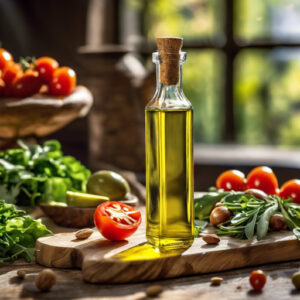
Healthy fats are an essential component of a plant-based diet, alongside fibres and phytochemicals. Using olive oil from plants is an excellent method to add nutritious fats to your dishes. Olive oil is packed with monounsaturated fats and antioxidants, making it an excellent choice for promoting heart health. It also has anti-inflammatory properties and can help improve the absorption of fat-soluble vitamins in leafy greens and other vegetables. Integrating nourishing fats such as olive oil, avocados, and nuts into your diet can enhance cholesterol levels, promote brain health, and lower the risk of chronic diseases.
Good vs. Bad Microbes
A diet rich in plants promotes the growth of beneficial microbes while reducing the presence of harmful ones. Various types of plant fibres provide a nourishing environment for beneficial microbes, which produce compounds that have anti-inflammatory properties. These compounds contribute to maintaining a healthy gut and reducing the chances of developing heart disease. On the other hand, harmful microbes flourish on highly processed foods, creating substances that can cause inflammation and pose risks to cardiovascular health. Emphasising the inclusion of whole, plant-based foods in your diet can positively impact your health. By promoting the growth of beneficial microbes, this dietary choice helps reduce inflammation and strengthen overall well-being. As a result, the risk of developing heart disease and other chronic conditions is lowered.
Research and Evidence
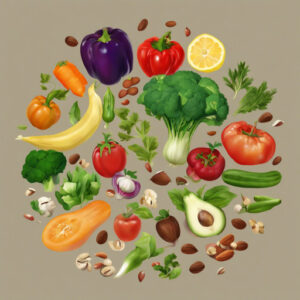 Research such as the American Gut Project has revealed that the key to a healthy microbiome lies in the diversity of plants consumed rather than the specific type of diet. Individuals who incorporate a variety of plants into their diet every week experience a more excellent range of gut microbes and have a reduced likelihood of carrying antibiotic-resistant genes. The variety of plants in our environment has been found to positively impact our health, helping to lower the chances of developing chronic conditions like obesity, diabetes, and heart disease. Several extensive studies have validated these findings, emphasising the significance of having a variety of plants in one's diet and maintaining healthy eating habits for the well-being of the gut and overall health.
Research such as the American Gut Project has revealed that the key to a healthy microbiome lies in the diversity of plants consumed rather than the specific type of diet. Individuals who incorporate a variety of plants into their diet every week experience a more excellent range of gut microbes and have a reduced likelihood of carrying antibiotic-resistant genes. The variety of plants in our environment has been found to positively impact our health, helping to lower the chances of developing chronic conditions like obesity, diabetes, and heart disease. Several extensive studies have validated these findings, emphasising the significance of having a variety of plants in one's diet and maintaining healthy eating habits for the well-being of the gut and overall health.
Challenges with Traditional Recommendations
Simply consuming five servings of fruits and vegetables daily is not enough if you want to diversify your diet. Adopting the 30-plant approach can significantly enhance your well-being and minimise the chances of falling ill. This method promotes diverse nutrients and advantageous substances, making it a more efficient strategy for boosting your overall health. By incorporating a diverse range of plant sources into your diet, you can enhance your nutrient intake and optimise the health advantages.
Global and Cultural Diets
Diets such as the Mediterranean diet and those observed in Blue Zones, where individuals enjoy longer and healthier lives, boast a wide array of plant-based foods. The Hadza tribe in Tanzania, known for their plant-rich diet, have been found to possess almost double the diversity of gut microbes compared to Western populations. This unique characteristic contributes to their reduced susceptibility to common diseases. These diets promote the consumption of whole foods, fresh herbs, and a range of plant-based proteins, emphasising the significance of incorporating diverse plants into one's diet for improved health and longevity.
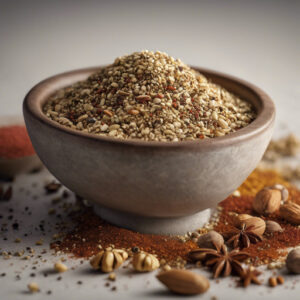 Tips for Including More Plants
Tips for Including More Plants
Herbs and Spices
Incorporating herbs and spices, including fresh ones, into your diet is crucial for a well-rounded plant-based eating plan. They contribute to your aim of consuming 30 different plant foods each week. By including a diverse range of nuts, seeds, and whole grains in your diet, you can enhance your meals' nutritional value and taste. Enhance your meals by adding dukkah, a delightful mixture of nuts, seeds, and spices. Not only will it elevate the flavour of your dishes, but it also provides a nutritious source of plant-based protein. Dukkah is a versatile seasoning that adds a delightful touch to salads and roasted vegetables and can even be used as a flavorful coating for tofu or fish before baking or grilling.
These three powerful ingredients – garlic, ginger, and turmeric – not only enhance the taste of your dishes but also provide anti-inflammatory properties and promote a healthy gut.
Sofrito base
A sofrito base is an essential ingredient in various cuisines, adding depth and flavour to dishes. It is made with celery, garlic, onions, carrots, and tomatoes, creating a versatile foundation for countless recipes. It is a versatile ingredient that adds depth and richness to various dishes, including paella, stews, soups, and pasta sauces. When you sauté these aromatic vegetables in olive oil until they're tender, you'll create a delightful and healthy base that elevates the taste of your dishes. Not only that, but it also adds fibre and antioxidants to your meals. Sofrito enhances the flavour of savoury dishes and boosts their nutritional content, making it a valuable asset to your plant-based culinary skills.
Fermented foods
Adding fermented foods to your diet can be a great way to support your gut health. Sauerkraut, kimchi, yoghurt, kefir, and kombucha are all examples of fermented foods that are rich in probiotics, which can help promote a healthy gut. Incorporating a combination of fresh and dried herbs, along with fermented foods, can contribute to a healthy gut and enhance your overall well-being. This will add a variety of flavours and beneficial nutrients to your diet. Incorporating these ingredients into your meals not only boosts the plant content in your diet but also provides a fantastic way to elevate meat-based dishes.
Seasonal Eating
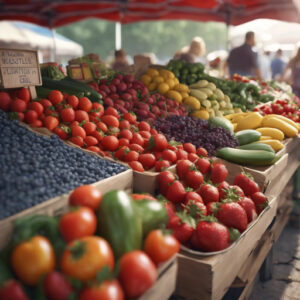 Embrace the abundance of seasonal fruits and vegetables to effortlessly diversify your diet with a wide array of plant-based goodness. It's always a good idea to have frozen staples like peas, edamame, and sweetcorn on hand. Don't forget to mix things up by regularly incorporating different varieties of beans, lentils, pulses, nuts, seeds, and spices into your diet to keep things exciting and ensure a diverse plant intake. Choosing to eat seasonally has multiple benefits for your health. Not only does it promote a healthy gut microbiome, but it also guarantees that you're getting the freshest and most nutrient-packed produce possible.
Embrace the abundance of seasonal fruits and vegetables to effortlessly diversify your diet with a wide array of plant-based goodness. It's always a good idea to have frozen staples like peas, edamame, and sweetcorn on hand. Don't forget to mix things up by regularly incorporating different varieties of beans, lentils, pulses, nuts, seeds, and spices into your diet to keep things exciting and ensure a diverse plant intake. Choosing to eat seasonally has multiple benefits for your health. Not only does it promote a healthy gut microbiome, but it also guarantees that you're getting the freshest and most nutrient-packed produce possible.
Easy Additions
Adding nut butter and spice/nut seasonings such as dukkah to your meals is a simple way to diversify your plant-based options. Adding foods such as pumpkin seeds and other plant-based proteins can elevate the quality of your diet. By incorporating these simple additions into your routine, you can experience a noticeable improvement in your gut health and overall well-being. Including a diverse selection of plant-based snacks and condiments, you can easily enhance your plant consumption and promote your well-being.
By highlighting the advantages of incorporating plants into your diet and embracing a diverse range of plant-based foods, you can nourish your gut microbes, improve your overall health, and experience a more vibrant and flavorful culinary experience. Remember that the key is not to cut out your favourite foods entirely but to incorporate a variety of new and diverse plants into your meals. Embracing a plant-based lifestyle with abundant fresh fruit, fragrant herbs, and nourishing olive oil can work wonders for your overall well-being. Not only can it improve your health and lower the chances of chronic ailments, but it can also assist you in reaching and maintaining a healthy weight. Take on the exciting task of incorporating 30 unique plants into your weekly meals and unlock the countless advantages of a nourishing, plant-centric diet. Your well-being and overall health will greatly benefit.
The Article: How to eat more plants; The health benefits of eating plants Appeared First On Jane Stevens Nutrition.
The Article: Ways To Eat More Plants and Enjoy Their Health Benefits appeared first on https://janestevens.net
The Article Ways To Eat More Plants and Enjoy Their Health Benefits Was Found On https://limitsofstrategy.com
The Article Ways To Eat More Plants and Enjoy Their Health Benefits First Appeared ON
: https://ad4sc.com
Comments are closed